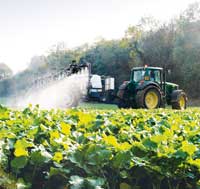£400,000 for Harper Adams crop protection research

Two researchers at Harper Adams have been awarded funds totalling £400,000 for crop protection projects, including one looking at how soil-borne diseases affect oilseed rape yields.
Vice-principal Peter Mills was granted £365,000 by the government-backed Technology Strategy Board (TSB) to look at increasing oilseed rape yields.
“Oilseed rape frequently doesn’t achieve its full yield potential,” said Prof Mills, explaining the project.
“We believe that this is because there are previously overlooked soil-borne diseases that affect the crop.”
The five-year project, led by Velcourt, will bring together agricultural industry partners including Harper Adams, NIAB TAG, Limagrain and Hutchinsons.
The study will investigate how widespread these pathogens are, then screen oilseed rape varieties for tolerance or resistance to the pathogens. It will also aim to develop control strategies for these disease.
Meanwhile, Simon Edwards secured £58,000 in funding for work looking at developing strategies against fusarium head blight (FHB) in malting barley.
Prof Edwards said the project will establish the links between agronomy, causal pathogens and severity of FHB and the subsequent impact on the safety and functional properties of barley for malting and brewing.
Findings from the project will provide vital information on the need to manage FHB in UK barley in relation to minimising further malting and brewing problems in the industry chain.
The study is being led by Velcourt in partnership with the University of Nottingham, SAB Miller, Syngenta Crop Protection, Syngenta Seeds and Openfield.
Funding for both projects was secured under the TSB Sustainable Agriculture and Food Innovation Platform, a five-year, £75m investment in innovative technological research and development in areas such as crop productivity, sustainable livestock production, waste reduction and management and greenhouse gas reduction.

